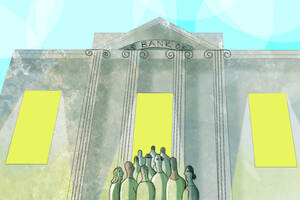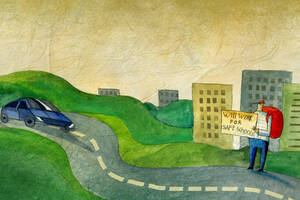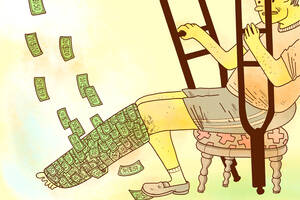Voting may feel like a regular part of the political landscape in many nations, but elections are also periods of uncertainty.
Events like elections can shake people’s fundamental need to believe in an orderly structured world. To counter this apprehension, new research suggests people’s faith in a higher power becomes stronger. Surprisingly, the research also finds that when faith in the stability of God or the government is shaken, people turn to the other entity to restore a sense of control.
Researchers examined whether changing political climates can drive religious belief, especially faith in a controlling or interventionist deity. They found that beliefs toward God and the government can help satiate the same psychological need for structure and order and are interchangeable with one another.
“This research holds important implications for our understanding of the formation and strengthening of religious belief,” says Adam Galinsky, a professor of management and organizations at the Kellogg School of Management and one of the study’s authors.
“This research holds important implications for our understanding of the formation and strengthening of religious belief.” — Adam Galinsky
“Although there are undoubtedly multiple causes of religious belief, one cause may be that when people perceive their government as unstable, they turn to God or other religious deities to fulfill a need for order and control in their lives,” adds Aaron Kay, an associate professor at Duke University and another of the study’s authors.
To test their theory, Galinsky, Kay, and their colleagues Steven Shepherd, a graduate student at the University of Waterloo, Craig Blatz, an instructor at Grant MacEwan University and Sook Ning Chua of McGill University, conducted a diverse set of experimental designs, laboratory, field settings, and independent and dependent measures. The experiments were designed to demonstrate that external systems of control can also compensate for one another. The researchers gathered results from college campuses in Malaysia and Canada which found that perceptions of decreased government stability, such as immediately before an election, led to increased beliefs in a controlling God. Conversely, increased perceptions of political stability led to weaker beliefs in an interventionist God.
In a longitudinal field study conducted in Malaysia, the researchers tested people’s sense of governmental stability and faith in a controlling God both before and after an election. Before the election, government instability was perceived to be high and people were more likely to believe in a controlling God, compared with immediately after an election, when a sense of government stability had been restored. In another study, when participants were led to believe that scientists have concluded that God is unlikely to intervene in the world’s affairs, they showed higher levels of government support compared with participants who were led to believe that God may play an interventionist role.
According to Kay, higher levels of religious belief, commitment, and possibly extremism might be more likely in those countries that have the least stable governments and other secular institutions.
“Particularly in today’s landscape and with the upcoming elections, we find uncertainty swirling around government,” Galinsky says. “It is in these cases when people are likely to turn to other sources of control, like putting faith in an intervening God.”
Kay, Aaron C., Steven Shepherd, Craig W. Blatz, Sook Ning Chua, and Adam D. Galinsky. 2010. “For God (or) country: The hydraulic relation between government instability and belief in religious sources of control.” Journal of Personality and Social Psychology 99(5): 725-739.


